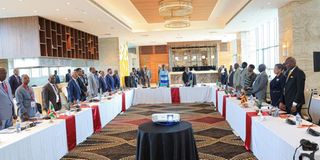Prime
Can EAC speak the same language? A linguistic challenge at Speakers’ forum

The Bureau of East African Community Speakers in Nairobi on November 13, 2024.
What you need to know:
- In Nairobi on Wednesday, this problem manifested after participants debated which language to use: English, French or Kiswahili, all of which are widely spoken in the region but with relative differences in competence. Then there are the rules.
Speakers of the East African Community (EAC) parliaments have often pushed for a parallel but related track of integration, seeing the networking of their Houses as crucial to expanding people-to-people interaction.
Which is why, they see the Bureau of East African Community Speakers as a cog in the wheel for such interaction. But language is proving to be a problem.
In Nairobi on Wednesday, this problem manifested after participants debated which language to use: English, French or Kiswahili, all of which are widely spoken in the region but with relative differences in competence. Then there are the rules.
At the 18th Bureau meeting in the Kenyan capital, National Assembly Speaker Moses Wetang’ula was elected chairman, taking over from Tanzania’s Tulia Ackson.
Under his first chairmanship, the assembly embarked on an unusual agenda. And Speaker Wetang’ula was tasked with giving direction on the official language for addressing the Bureau.
The issue arose after Abel Gashatis, Burundi’s Second Deputy President of the National Assembly, asked to read his speech in French because he did not speak English.
Tanzania’s Ackson, who was recently elected president of the 31st Inter-Parliamentary Union, the international organisation of national parliaments, also asked to speak in Kiswahili.
She asked Wetang’ula to guide the assembly on the use of EAC’s official languages.
“As you ponder on whether one can address in French, also ponder on whether one can address in Kiswahili or any other language,” she said.
Article 137 of the Treaty establishing the EAC states that “English shall be the official language of the Community while Kiswahili will be developed as a lingua franca”.
This provision was amended in 2021 to include French as a lingua franca, but there has been ambiguity on how to elevate French to official status given that two member States –Burundi and the Democratic Republic of Congo– use the language in official business.
Acknowledging that some EAC member States are predominantly French-speaking, Wetang’ula allowed Gashatis to read his speech in French, which was translated into English by his compatriot, Burundi’s Senate Speaker, Emmanuel Sinzohagera.
Linguistic challenges have emerged on prior occasions.
French commitment
The East African Legislative Assembly (Eala) and the East African Court of Justice have often bickered over whether documents should be translated into French.
Recently, the EAC Secretariat requested the French government to support a programme to improve French language proficiency in the bloc.
The EAC and the French government had signed an agreement in March 2020, setting in motion efforts to make French as an official language of the EAC, alongside English. However, the process was slowed down by Covid-19.
France had pledged to assist the bloc in a study on the modalities for the inclusion of French as an official language of the EAC as part of the implementation of Resolution 25 of the 15th Summit of EAC heads of State and government held on November 30, 2013.
Frederic Clavier, the French Ambassador to Tanzania, who spoke at the signing of the memorandum of understanding (MoU) at the time, said the French government would fund the programme to the tune of €42,511 ($44, 931).
In Nairobi on Wednesday, Mr Wetang’ula urged regional integration while addressing Eala officials and speakers of the national assembly, senate, and parliamentary officials from EAC member States including Kenya, Uganda, Burundi, South Sudan, Tanzania, Somalia and Rwanda.
“Let us reaffirm our commitment to parliamentary diplomacy as a tool for fostering regional cooperation and development. Together we can build a stronger and more resilient East African Community.”
The participants also discussed the 14th edition of the Inter-Parliamentary Games to be held next month in Mombasa, from December 6 to 18, 2024.
“The EAC Bureau of Speakers conceptualised the Inter-Parliamentary Games in a bid to foster relations between Eala and the national parliaments of the EAC, as well as to popularise EAC integration,” said Mr Wetang’ula.
Eala Speaker Joseph Ntakirutimana cited the lack of implementation of the common market protocols as one of the major impediments derailing the EAC.
“Our truck drivers are taking too much time to be cleared at our borders where there are no facilities,” Mr Ntakirutimana said.
“I know you have travelled between our countries and noticed that air tickets between our partner States are costlier than those we get to travel to Europe. That is not sustainable and only goes to limit our movement in the region.”
He acknowledged that Eala has had its fair share of challenges, ranging from legislation to budgetary constraints, even as the EAC continues to grow.





